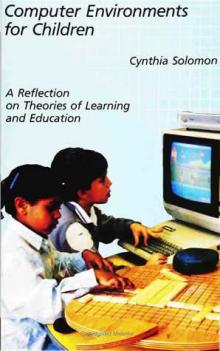 Zusammenfassungen
Zusammenfassungen
 What are computers in education being used for? In this book, Cynthia Solomon takes a welcome look at the possibilities and issues of learning with and about computers in schools or in any other learning environment.
What are computers in education being used for? In this book, Cynthia Solomon takes a welcome look at the possibilities and issues of learning with and about computers in schools or in any other learning environment.
Solomon focuses on the use of computers within the framework of recent innovative theories of learning and education, particularly in elementary school mathematics. She devotes an entire chapter each to the work of Patrick Suppes, Robert Davis, Tom Dwyer, and Seymour Papert.
 Kapitel
Kapitel 
- 1. Computers in Education
- 2. Suppes: Drill and Practice and Rote Learning

- 3. Davis: Socratic Interactions and Discovery Learnmg

- 4. Dwyer: Eclecticism and Heuristic Leaming

- 5. Papert: Constructivism and Piagetian Learning

- 6. Trends in Practice

- 7. Computer Educators

 Dieses Buch erwähnt ...
Dieses Buch erwähnt ...
 Dieses Buch erwähnt vermutlich nicht ...
Dieses Buch erwähnt vermutlich nicht ... 
 Nicht erwähnte Begriffe | Bildung, Digitalisierung, Eltern, Informatik-Didaktik, Informatik-Unterricht (Fachinformatik), Internet, Kognitivismus, Primarschule (1-6) / Grundschule (1-4), Schweiz, Unterricht |
 Tagcloud
Tagcloud
 Zitate im Buch
Zitate im Buch
 The computer, when used in education, has a way of exaggerating differences: Behaviorist educators become more behaviorist, and proponents of open education come to espouse greater degrees of freedom.
The computer, when used in education, has a way of exaggerating differences: Behaviorist educators become more behaviorist, and proponents of open education come to espouse greater degrees of freedom. Zitationsgraph
Zitationsgraph
 Zitationsgraph (Beta-Test mit vis.js)
Zitationsgraph (Beta-Test mit vis.js)
 Zeitleiste
Zeitleiste
 7 Erwähnungen
7 Erwähnungen 
- An Exploration in the Space of Mathematics Educations (Seymour Papert) (1996)


- Beyond Adoption to Invention - Teacher-Created Collaborative Activities in Higher Education (Mark Guzdial, Jochen Rick, Colleen Kehoe) (2001)

- Never Mind the Laptops - Kids, Computers, and the Transformation of Learning (Bob Johnstone) (2003)


- Tracing the Dynabook - A Study of Technocultural Transformations (John W. Maxwell) (2006)


- Learner-Centered Design of Computing Education - Research on Computing for Everyone (Mark Guzdial) (2015)


- Coding Literacy - How Computer Programming Is Changing Writing (Annette Vee) (2017)

- Individuelle Förderung und Digitalität (Götz Bieber, Julia Gerick) (2022)


- Was unter «Individuelle Förderung und Digitalität» verstanden wird, ist oft sehr individuell… - … und wird zunehmend von der eingesetzten Software geprägt (Beat Döbeli Honegger) (2022)


- Was unter «Individuelle Förderung und Digitalität» verstanden wird, ist oft sehr individuell… - … und wird zunehmend von der eingesetzten Software geprägt (Beat Döbeli Honegger) (2022)
 Co-zitierte Bücher
Co-zitierte Bücher

Understanding Computers and Cognition
A New Foundation for Design
(Terry Winograd, Fernando Flores) (1987)


Oralität und Literalität
(Walter Ong)
How Big Media Uses Technology and the Law to Lock Down Culture and Control Creativity
(Lawrence Lessig) (2004)



 Volltext dieses Dokuments
Volltext dieses Dokuments
 | Computer Educators: Artikel als Volltext ( : :  , 677 kByte) , 677 kByte) |
 | Computer Environments for Children: Gesamtes Buch als Volltext ( : :  , 7202 kByte) , 7202 kByte) |
 | Davis: Socratic Interactions and Discovery Learnmg: Artikel als Volltext ( : :  , 1235 kByte) , 1235 kByte) |
 | Dwyer: Eclecticism and Heuristic Leaming: Artikel als Volltext ( : :  , 1258 kByte) , 1258 kByte) |
 | Papert: Constructivism and Piagetian Learning: Artikel als Volltext ( : :  , 1253 kByte) , 1253 kByte) |
 | Suppes: Drill and Practice and Rote Learning: Artikel als Volltext ( : :  , 592 kByte) , 592 kByte) |
 | Trends in Practice: Artikel als Volltext ( : :  , 481 kByte) , 481 kByte) |
 Standorte
Standorte 
 Bibliographisches
Bibliographisches 
 Beat und dieses Buch
Beat und dieses Buch
Beat hat dieses Buch während seiner Zeit am Institut für Medien und Schule (IMS) ins Biblionetz aufgenommen. Beat besitzt ein physisches und ein digitales Exemplar. (das er aber aus Urheberrechtsgründen nicht einfach weitergeben darf). Es gibt bisher nur wenige Objekte im Biblionetz, die dieses Werk zitieren.









 Computer
Computer Geometrie
Geometrie Kinder
Kinder LehrerIn
LehrerIn Lernen
Lernen LOGO (Programmiersprache)
LOGO (Programmiersprache) Mathematik
Mathematik Programmieren
Programmieren Schule
Schule turtle graphics
turtle graphics




















 Biblionetz-History
Biblionetz-History